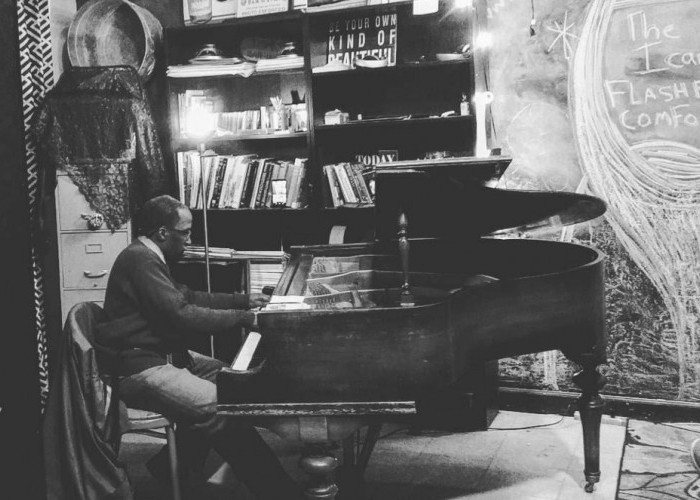Jan 13, 2026 2:09 PM
More Trump-Kennedy Center Cancellations
The fallout from the renaming of the John F. Kennedy Center for the Performing Arts to include President Donald…

Chicago pianist Charles Joseph Smith says War Of The Martian Ghosts, which he began composing in the ’90s, was inspired by saxophonist Caroline Davis, the film Mars Attacks! and techniques of minimalist composers.
(Photo: Pasha Petrosyan)Pianist Charles Joseph Smith always has used music to challenge limitations. When this world offered him only scant possibilities, he went on to imagine a new one. His War Of The Martian Ghosts (Sooper) envisions battles on the planet that sound like they’re being fought against a backdrop of modern ragtime. Smith also has leapt over formidable barriers within his hometown, Chicago.
Smith was diagnosed with autism when he was a child on the city’s South Side. While it could have hindered some of his scholastic achievements, he completed a doctorate degree in music at the University of Illinois. Smith also refutes the image of savants as isolated, as he has sought out ideas from different musical communities alongside his own ballroom and interpretive dance performances.
“Even though there’s some mis-wiring in my brain, it caused other parts of the brain to compensate,” Smith said at his favorite coffeehouse in Chicago’s Logan Square neighborhood. “Sometimes, it comes out as finite intelligence in some subjects, but not in others. With the savant syndrome, you know a lot more about music and all that than anything else. So, I know more about music than math, or reading or science or history. But sometimes being over-fixated on music gave me an advantage.”
Family and community support were also key. Smith’s parents bought him a piano when they saw him avidly try to read the sheet music at his grandmother’s house. He’d play jazz at home in piano/organ duos with his brother Stan. And as he combined self-taught explorations with private lessons, more people noticed his abilities as a classical pianist. The late impresario Earl Calloway, also a longtime cultural correspondent for the Chicago Defender newspaper, presented him performing Bach fugues in such venues as the Fine Arts Building downtown. After performing in student competitions, Smith enrolled in the music program at Roosevelt University, where he could indulge his affinity for opera, especially the Spanish dances in Georges Bizet’s Carmen.
While Smith a pursued graduate-level education, the final stages of the doctoral program included its own challenges.
“When it came to thesis time, I started to fall in love with writing and wanted to do a formal thesis,” Smith said. “I was afraid of doing a doctoral recital because of my autism. So, I decided to write a 400-page thesis on Franz Liszt transcriptions. But I realized I couldn’t escape speaking in front of an audience. Fortunately, I passed.”
Smith used this influence and a synthesizer his father bought him to start creating songs for War Of The Martian Ghosts in the late 1990s. He said additional inspiration came from jazz saxophonist Caroline Davis’ improvisational acumen, the film Mars Attacks! and the techniques of such minimalist composers as Steve Reich.
“Autistics love repetition because some behaviors go on and on and on without stopping,” Smith said. “Like how when you’re autistic, you bob your head. That’s why I also like house music.”
After putting War Of The Martian Ghosts aside, Smith revisited it years later, recasting the score from synthesizer to piano. Smith bought a CD recorder and started selling his music around Chicago, performing in small venues, as well as participating in dance competitions at house clubs. Sooper then released his record in an unconventional manner—only on cassette and as a digital download. But Smith never wanted to stick with any kind of orthodoxy.
“My destiny was to create something neoclassical and neo-Romantic, but I try not to limit myself to these parameters,” he said. “I might want to go the Buddhist route like Herbie Hancock—I need something from above. Or I might rent a van and tour from city to city. I think I’m ready for it.” DB

Belá Fleck during an interview with Fredrika Whitfield on CNN.
Jan 13, 2026 2:09 PM
The fallout from the renaming of the John F. Kennedy Center for the Performing Arts to include President Donald…

Peplowski first came to prominence in legacy swing bands, including the final iteration of the Benny Goodman Orchestra, before beginning a solo career in the late 1980s.
Feb 3, 2026 12:10 AM
Ken Peplowski, a clarinetist and tenor saxophonist who straddled the worlds of traditional and modern jazz, died Feb. 2…

The success of Oregon’s first album, 1971’s Music Of Another Present Era, allowed Towner to establish a solo career.
Jan 19, 2026 5:02 PM
Ralph Towner, a guitarist and composer who blended multiple genres, including jazz — and throughout them all remained…

Rico’s Anti-Microbial Instrument Swab
Jan 19, 2026 2:48 PM
With this year’s NAMM Show right around the corner, we can look forward to plenty of new and innovative instruments…

Richie Beirach was particularly renowned for his approach to chromatic harmony, which he used to improvise reharmonizations of originals and standards.
Jan 27, 2026 11:19 AM
Richie Beirach, a pianist and composer who channeled a knowledge of modern classical music into his jazz practice,…